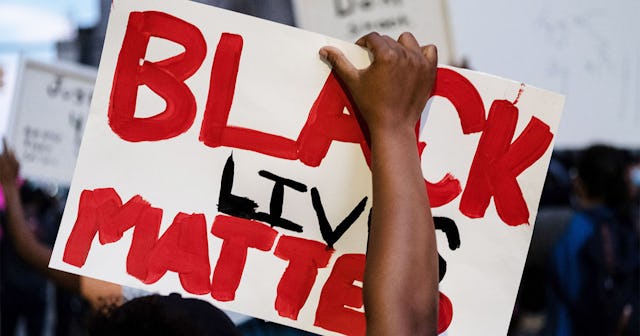For The White Folks Who Can't Stop Thinking About Breonna Taylor

This morning, my son looked over my shoulder as I browsed the morning news on Twitter. He’s seven and working on his reading skills. He spotted an image with a protestor holding a sign. He quickly read a line about Breonna Taylor, a Black woman, being killed by police. Then he looked up at me with his big, brown eyes and said, “Why did the police kill a Black lady? That was mean.”
Only one of the three officers involved in Breonna Taylor’s murder is facing charges, and I can’t stop thinking about it. Every time I look at my children, all of whom are Black, I pray they stay safe, grow up happy and healthy, and that no one endangers their lives, or worse. I teach them the rules, like no hoods up or hands in their pockets in stores and absolutely no toy guns outside. However, they could be doing something perfectly normal, like sleeping, bird watching, playing in a park, walking home from a gas station with some snacks, or playing video games, and have their lives endangered.
What makes Taylor’s death and the lack of charges against the officers even more difficult is that there are still so many white people who just don’t get it—and don’t want to get it. They’d rather remain comfortable and complacent than become anti-racist.
https://www.instagram.com/p/CFfvtXHh9ZY/?utm_source=ig_web_copy_link
To me, it’s so glaringly obvious that every life should matter, but in America, this isn’t true yet. I desperately wish every person could see the value of Black lives, and not only see, but also understand, empathize, and advocate.
However, this won’t happen until white people become allies. Legitimate allies. Allyship takes work — continuous, difficult, uncomfortable work. Unfortunately, many aren’t willing to go there. It’s heartbreaking, because I want my children to grow up in a world where they have opportunities to thrive.
Some white people talk in circles. They claim to be colorblind, while they are openly critical of “those people” who “riot.” They fixate on one factor (usually based on stereotypes or false statistics), like Black-on-Black crime or “the race card” as their defense. I’m exhausted by the repeated refusals to acknowledge injustice. Pointing fingers at the victims is appalling, a betrayal. I also realize that if I’m this exhausted as a white woman, my friends of color and my own four kids must be beyond. Putting up with white nonsense, day in and day out, wears on a person.
https://www.instagram.com/p/CFfz1nhn37M/?utm_source=ig_web_copy_link
I’m tired of white people saying that Black people are “so strong” and “resilient.” I look at my children and wonder, why should Black people have to endure so much pain, violence, and aggression? Why is our nation so focused on white comfort? Why can’t Black people safely and freely go about their day to day lives without fear of oppression?
It’s been over 400 years of racism, and white supremacy is still woven into America’s fabric. Racism isn’t just part of our country. It is the foundation of our country, often disguised as patriotism and allegiance to red, white, and blue, the founding fathers, our current president, and whitewashed history rather than making sure, with systemic change, that all men and women are truly valued as equals. Where is the liberty and justice for all?
Until we hold every person accountable for their racism, from microaggresions to worshipping MAGA, there won’t be authentic and long-lasting change. The responsibility falls on white people, the ones who uphold systems and policies that ensure a lack of equity. It’s difficult to see these when you’re white, because you are used to being the norm and the standard. Certainly, it’s easier to deny them or excuse them than to accept the reality.
What brings bias and injustice to light? I believe there’s a desperate need for self-education, self-reflection, and then, action. We shouldn’t burden our friends of color with teaching us about racism and how to be anti-racist. There are plenty of amazing resources, including books, articles, documentaries, and podcasts that we can learn from.
Learning about racism is extremely uncomfortable. The minute I use words like “white privilege,” “white supremacy,” “microaggressions,” “tokenism,” and others, I sense an immediate defensive vibe. When someone is defensive, they immediately retreat while simultaneously getting angry. When this happens, they are no longer listening, and thus, cannot learn. What if, instead, you learn the definitions of these, reflect on them, and ask yourself what the next steps are?
Becoming anti-racist takes humility, commitment, acceptance, and empathy. If you’re reading this and thinking, “Wow, that’s a lot of work,” you’d be correct. It is work: never-ending, messy work. You have to be willing to be vulnerable. White people have been conditioned to believe that we are always the authority, the truth-bearers, and that we deserve respect and trust. Unlearning this is arduous.
What is the alternative? It is absolutely easier to lean back, cross our arms, and refuse to engage. However, this only feeds supremacy. Unfortunately, too many people believe that there is a safe middle ground when it comes to racism and anti-racism. There is not. One is either committed to racism or anti-racism. There’s no gray area, no middle lane, no straddling the proverbial fence. Choosing to not become anti-racist is choosing racism. Silence is also racism.
White people, we must stop seeking to be coddled, patted, and soothed like infants. The fight for racial equity isn’t about our feelings, including guilt. It’s time to grow up and stop deflecting and blaming.
Personal responsibility is where true change begins. Today is the day you can choose to de-center yourself and acknowledge that you have an opportunity to be part of a movement that can change, or even save, lives.
This article was originally published on